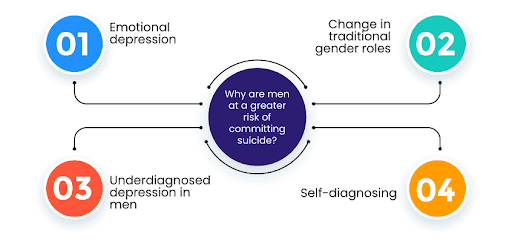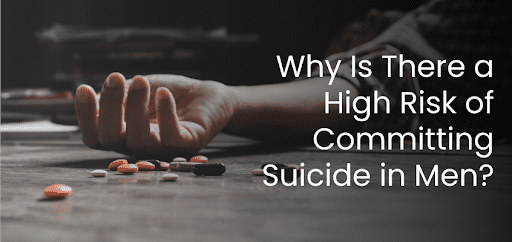Introduction
In today’s hyper-aware age, there is a steady rise in people suffering from mental illnesses. With our lives getting more complicated, we tend to live under constant stress and anxiety.
People often feel undermined and unworthy due to the social and peer pressure to perform well in all areas of life. Coupled with extreme stress and loneliness, it can often lead to suicidal thoughts. Studies show that the number of men who tend to end their lives prematurely by suicide is more than women, even though women are more prone to suicidal thoughts. Hence, there is a high risk of committing suicide in men.
Let us look at a few reasons why this has become a prevalent phenomenon.
Our Wellness Programs
What are the risk factors which make men commit suicide?
Suicidal thoughts stem from mental illness. Issues in personal or professional life may instigate such ideas in men.
Here are some common risk factors for high risk of committing suicide in men.
- Being bullied at work or school
- Divorce or difficulty in being in a relationship
- Physical and sexual abuse
- Loss of someone close to them
- Illness related to depression or debilitating physical conditions
- Inability to form meaningful relationships with other people
- Loneliness
- Misery or not having sufficient money
- Overconsumption of drugs or alcohol, which one may use to temporarily cope with emotions, relationships, and the pressure of work
In older men, suicide is more related to loneliness, diseases, physical pain, illness, guilt, and hopelessness.
Looking for services related to this subject? Get in touch with these experts today!!
Experts

Neelam Parwani

India
Life Coach
Experience: 5 years

Mansi Chawla

India
Psychologist
Experience: 12 years

Sapna Zarwal

India
Psychologist
Experience: 19 years

Deepti Gandhi

India
Life Coach
Experience: 6 years

Zabby Sharma

India
Life Coach
Experience: 11 years

Ritu Singh

India
Life Coach
Experience: 16 years
Why are men at a greater risk of committing suicide?
Like women, men also undergo a lot of stress at work and home. They often feel social expectations to perform their best. This pressure may be too much sometimes, and they end up suffering from depression or having suicidal thoughts.
Here are some common reasons why there is a high risk of committing suicide in men:

- Emotional depression: Society tells men that they must be tough and not ask for help. Such gender norms may lead to emotional depression and, in very severe cases, thoughts of suicide.
- Change in traditional gender roles: Today, women are at par with men in all fields. With women not being dependent on men anymore, men find this intimidating. When men lose their traditional roles of a provider in the family, it may affect them more than society perceives.
- Underdiagnosed depression in men: Societal norms do not allow men to discuss their problems openly. Due to this, men do not even think about seeking help for their mental issues. It may lead to a build-up of negative emotions, ultimately leading to suicidal thoughts.
- Self-diagnosing: Research shows that depression is diagnosed less in men as they do not seek help for their illness. Instead, they tend to self-monitor symptoms and try to self-treat. They may also consume alcohol or drugs or overburden themselves with work.
Statistics of high risk of committing suicide in men
Global trends indicate that in 2019, while the suicide rate of women was around 6%, it was close to 13% in males per 100,000 people. However, this percentage was even more skewed in countries with poor economic growth. Suicide is the second leading cause of death for people in the 15-24 age bracket. These statistics are extremely concerning.
Death by suicide is the tenth leading cause of death worldwide, and the number of people dying by suicide is increasing. Suicide is a problem that needs immediate attention.
How to overcome the high risk of committing suicide in men
The stigma around mental health is gradually decreasing. Here are a few things you can keep in mind to help the men around you.
1. Watching for signs of depression:
There are many symptoms of depression that you can look out for to provide support to your loved ones. Some symptoms include:
- Stress
- Anxiety
- Social withdrawal
- Irritability
- Loss of interest
- Physical pain
- Complaints
- Unnecessary health risks
- Overconsumption of drugs and alcohol
2. Offering a support network:
A sound support system will go a long way in creating a safe space for men having suicidal thoughts. If you notice anyone in your family or at work showing signs of depression, offer them support and encourage them to seek professional help.
3. Removing the social stigma:
Societal concerns prevent men from seeking help for their mental issues. It is essential as a society to create awareness regarding mental health issues that affect men. Openly discussing such problems at work or among your social circle can encourage men to stand up for themselves and seek the help they need.
Even though having depressive thoughts does not equate to suicidal thoughts, keeping the above points in mind will help you provide a better support system to the people in your life. However, people who often feel suicidal thoughts may just brush it off as stress. It is also one of the reasons they do not seek help on time. So make sure to be attentive in case you are concerned for the mental health of someone you know.
Some more tips that reduce the high risk of committing suicide in men
Besides the above-stated tips to prevent suicide in men, here are more prevention tips that reduce the high risk of committing suicide in men :
- Make mental health support options like therapy and counselling readily available to everyone.
- Create opportunities that bring people together to form social connections and find support.
- Restrict access to lethal means of suicide, such as firearms and prescription drugs.
Conclusion
Encouraging men to seek help and creating a positive space to express their feelings and thoughts is extremely important to prevent suicidal thoughts. Removing the stigma around mental health is the need of the hour. There are also effective treatments available for suicide and depression—psychotherapy and antidepressants, and sometimes a combination of both may be prescribed by a consulting psychiatrist if required. The most important thing to remember is always hope and that recovery is possible.














